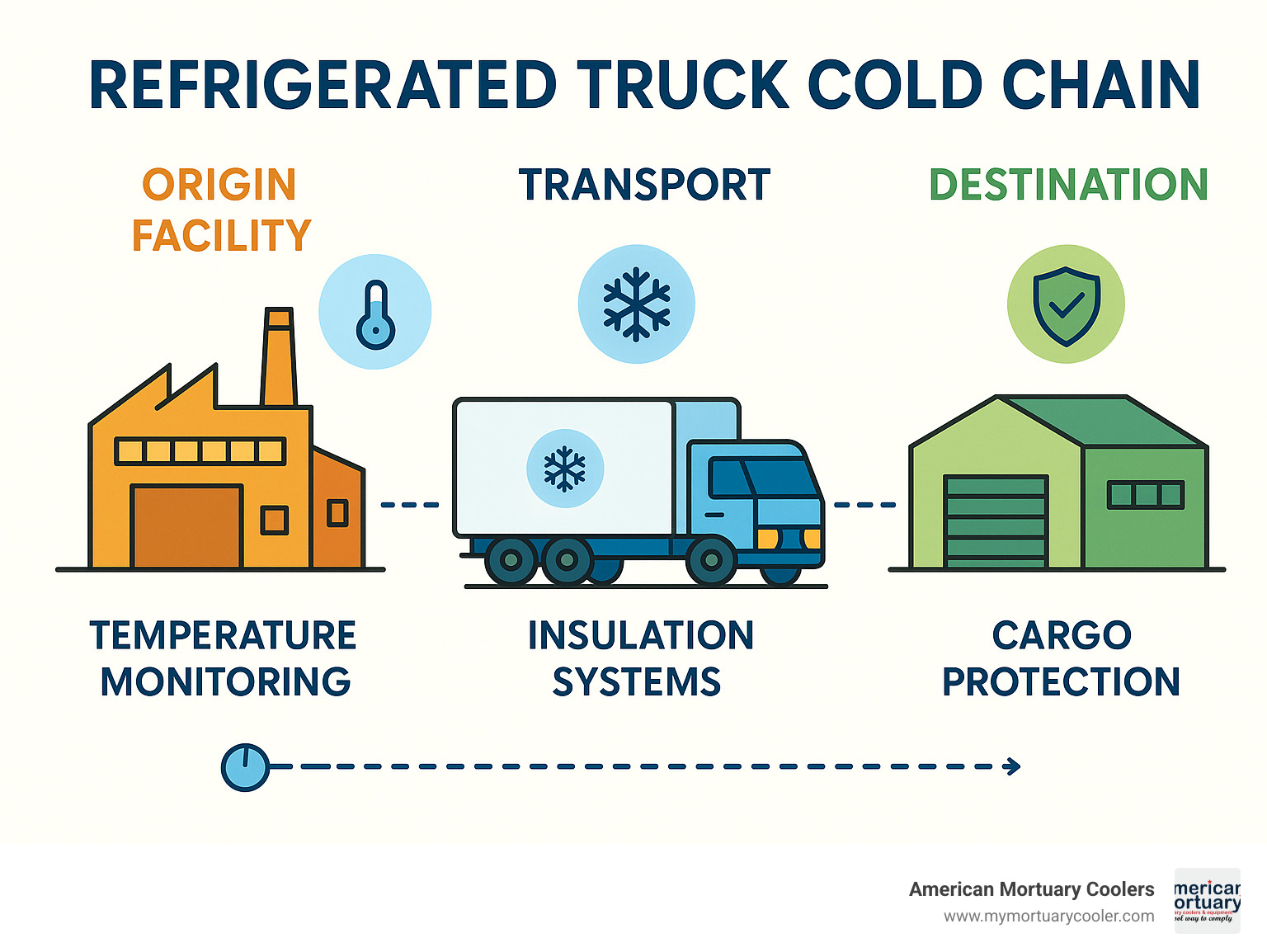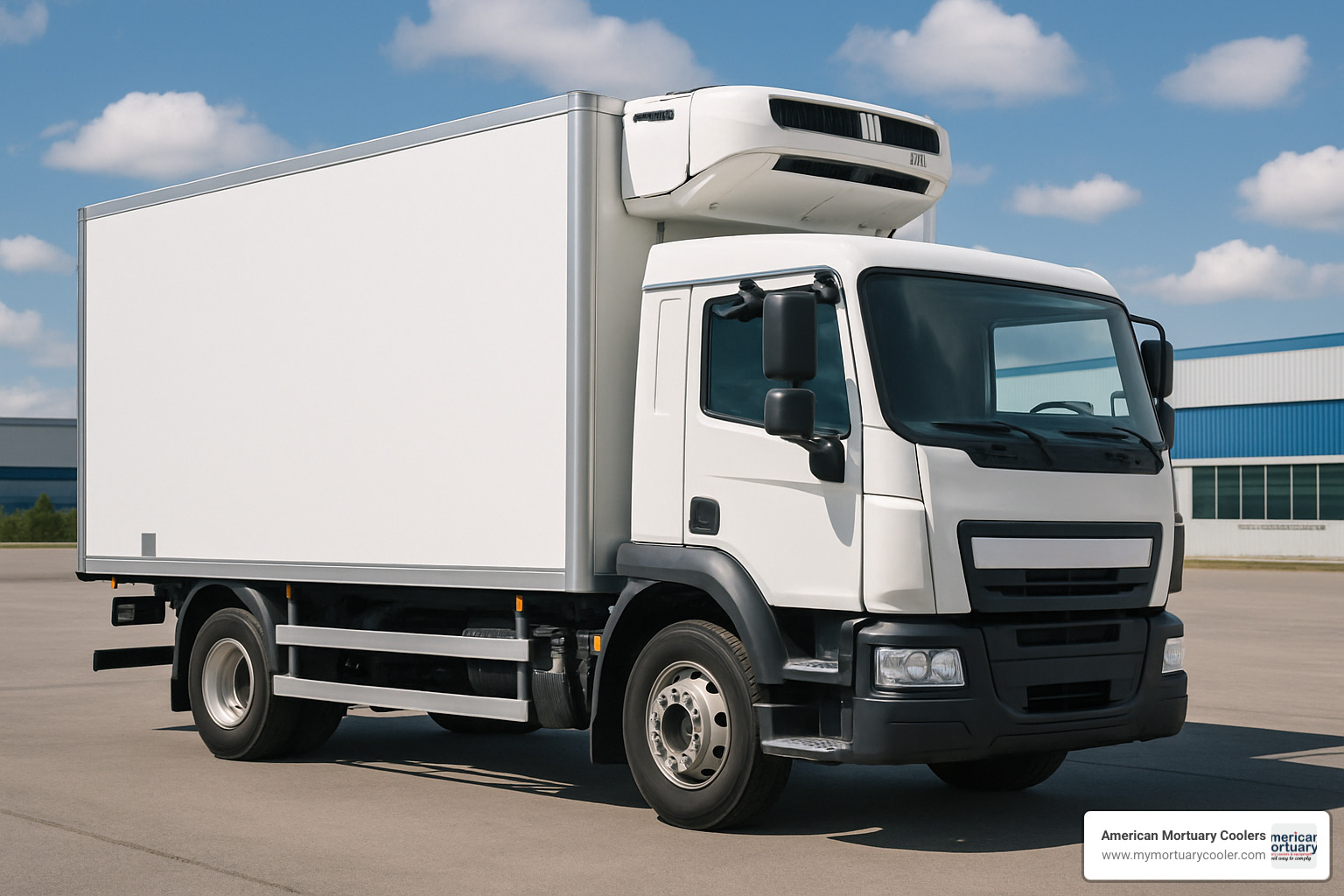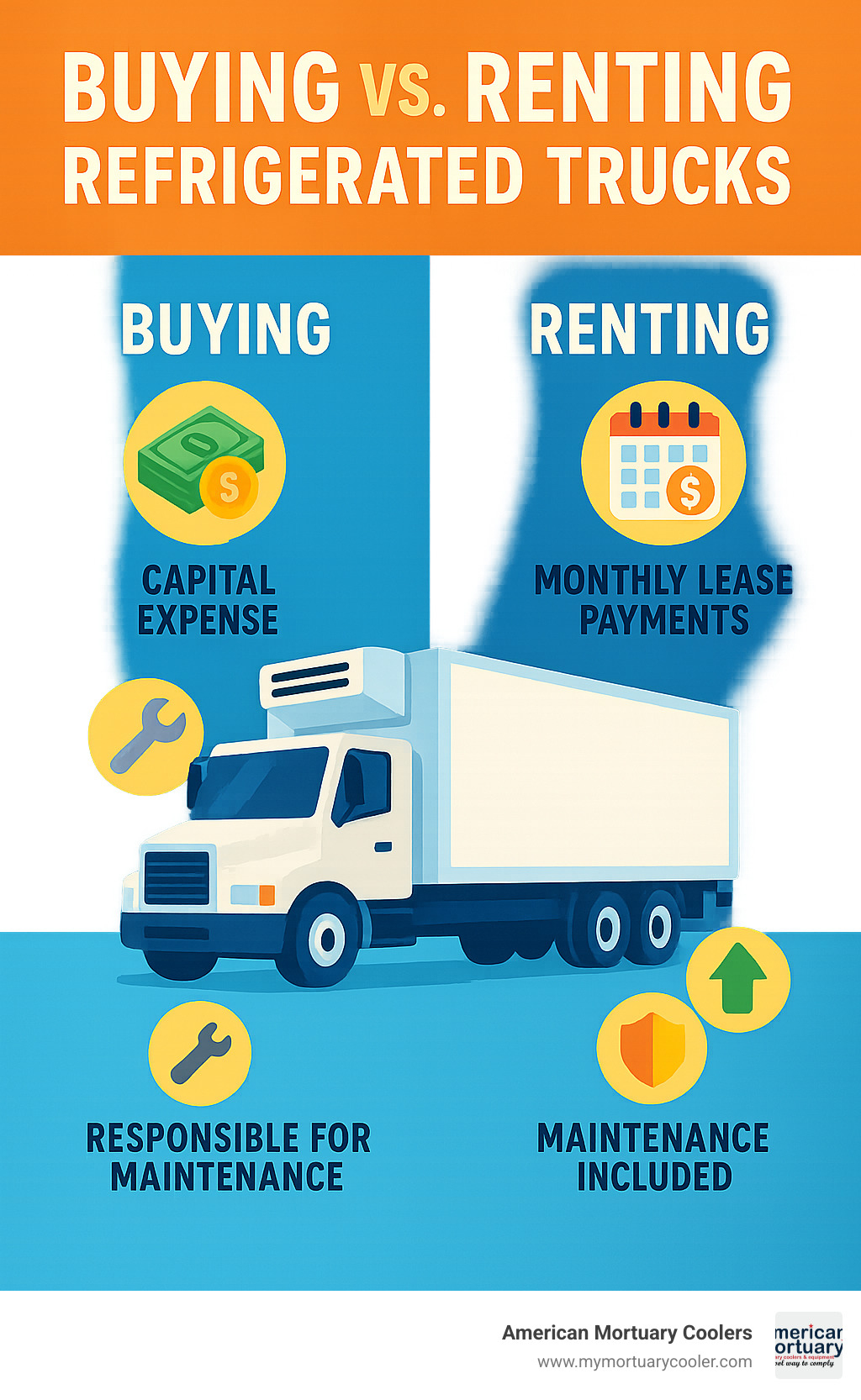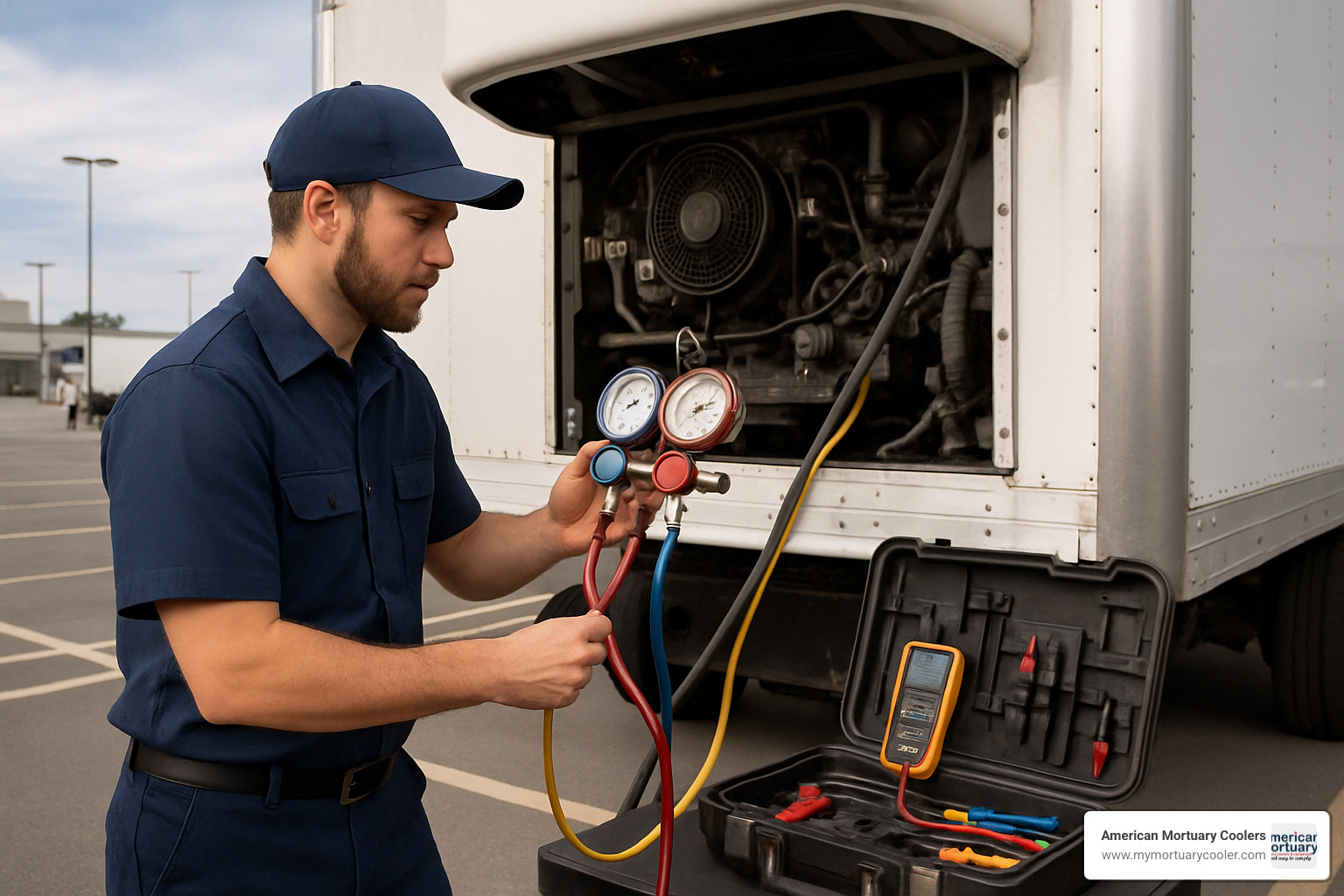
The Ultimate Guide to Refrigerated Truck Options
Why Refrigerated Trucks Are Essential for Temperature-Sensitive Transport
A refrigerated truck DD often called a "reefer" DD is a road-worthy cooler that keeps perishable cargo within a narrow temperature band from the moment it leaves the warehouse to final delivery. Whether you are moving ice cream, vaccines, or temporary morgue contents, active cooling protects product quality and public health.
Key refrigerated-truck facts at a glance:
- Temperature range: -206 B0F to +706 B0F
- Cooling sources: mechanical TRUs, ice, dry ice, or liquid CO12
- Sizes: compact vans to 53-ft trailers
- Power: diesel, electric standby, or hybrid
- Industries served: food, pharma, floral, chemical, and emergency storage
Modern reefers deliver:
- Consistent temperatures regardless of weather
- Compliance with FSMA and similar food-safety rules
- Telematics for real-time monitoring and automatic record keeping
American Mortuary Coolers designs cold-storage systems for funeral homes and emergency response teams nationwide. Many of the principles that keep groceries fresh also allow our mobile morgue units to maintain respectful, regulated conditions during high-capacity events.

Refrigerated Truck 101: How It Works
A refrigerated truck operates on the same vapor-compression cycle as your kitchen fridge, just beefed up for the highway.
- Compressor: a diesel- or belt-driven pump squeezes refrigerant into a hot, high-pressure gas.
- Condenser: exterior coils vent that heat to the outside air, turning the gas back into liquid.
- Evaporator: inside the cargo box, the liquid flashes back to gas, absorbing heat and chilling the load.
- Insulation: closed-cell polyurethane (about R-6.5 per inch) traps the cold so the system doesnt work harder than necessary.
Because the Transport Refrigeration Unit (TRU) engine is separate from the trucks main engine, the box stays cold during stops. According to UNEP research, modern TRUs are far more efficient and ozone-friendly than earlier models.
Cooling Methods
- Ice: low tech, good for very short hauls.
- Dry ice: 3109 B0F, perfect for small pharma loads.
- Liquid CO12: rapid pull-down for specialty cargo.
- Mechanical reefers: the industry workhorse, offering both cooling and heating as needed.
Temperature Monitoring & Control
Digital controllers maintain set points within about 1 B0F. Telematics send alerts to fleet managers and simplify FSMA compliance. Optional vent doors allow the same truck to haul dry freight on backhauls, improving utilization.
Types, Sizes & Key Features
Reefers come in three broad weight classes:
- Light-duty vans (GVWR <10,000 lb) 3 no CDL, great for florist or bakery routes.
- Medium-duty trucks (10,001–26,000 lb) 3 14–26 ft bodies, up to ~8,000 lb payload.
- Heavy-duty straight or trailer units (>26,000 lb) for national distribution.
Popular add-ons include liftgates, E-track, curbside service doors, and electric standby plugs. Polyurethane foam insulation and direct-drive TRUs maximize payload and fuel economy.
Sizing Tips
- Check actual payload after accounting for the TRU weight.
- Staying under 26,000 lb GVWR keeps you in non-CDL territory.
- On urban routes, smaller trucks save time (and mirrors).
Bodies & Configurations
- Straight trucks: cab and box are one piece; ideal for regional work.
- Semi-trailers: 48–53 ft for long hauls.
- Container reefers: intermodal, perfect for global supply chains.
- Special-purpose builds: vaccine, blood, or mobile morgue units—an area where American Mortuary Coolers provides turnkey solutions.
Uses, Regulations & Safety Standards

Primary markets for refrigerated trucks include food, pharmaceuticals, flowers, certain chemicals, and emergency mortuary storage. During COVID-19, reefers served as temporary morgues, underscoring their versatility.
Key U.S. rules to know:
- FSMA & the Sanitary Transportation Rule: continuous temperature logs, cleanable interiors.
- HACCP: identify hazards and set critical control points.
- DOT weight limits & CDL thresholds: the TRU adds weight—plan accordingly.
Quick Compliance Checklist
- Pre-cool box before loading.
- Inspect door seals daily.
- Keep automatic temperature records.
- Sanitize interiors on a set schedule.
Canadian Snapshot
Roughly 4 million reefer vehicles run worldwide; of the 51 used units listed across Canada, Freightliner, Hino, and Isuzu dominate, mostly in the 14–26 ft range that suit dense urban corridors.
Buying vs Renting & Leading Brands

Should you buy or rent a refrigerated truck? In short:
- Buy when you run daily routes, need custom specs, and want long-term cost control.
- Rent for seasonal peaks, pilot programs, or predictable monthly budgeting.
Up-front cost for a new reefer often exceeds $80k, whereas rentals spread costs but include mileage caps.
Truck brands common in North America:
- Freightliner: broad dealer network
- Hino: fuel-efficient medium-duty models
- Isuzu: cab-over maneuverability
For TRUs, Thermo King and Carrier Transicold remain the serviceability leaders. Emerging makers such as SolarTechTRU target zero-emission mandates.
Need deeper cost details? See our Ultimate Guide: Refrigerated Truck Lease.
Operation, Maintenance & Future Trends

Daily walk-arounds—fuel, seals, and temperature display—catch most issues before they jeopardize cargo. Weekly coil cleaning and monthly oil/filter changes on the TRU keep efficiency high. Annual inspections verify refrigerant levels, insulation integrity, and compressor health.
Smart telematics now flag faults before they escalate, boosting uptime and simplifying audits.
Whats Next?
- Electric or fuel-cell reefers to eliminate diesel emissions
- Electric standby plugs for dockside cooling without idling
- Solar roofs & lightweight composites that extend range and payload
- Low-GWP refrigerants (CO12, ammonia) in response to HFC phase-downs
American Mortuary Coolers follows these trends closely so our clients receive the most efficient, future-ready mobile refrigeration available.
Frequently Asked Questions about Refrigerated Trucks
How much temperature range can a refrigerated truck maintain?
Modern refrigerated trucks are surprisingly versatile when it comes to temperature control. Most units can maintain temperatures anywhere from -20°F to +70°F, though the exact range depends on your refrigeration unit and insulation quality.
For everyday food transport, you'll typically see fresh products kept between 32°F and 38°F, while frozen goods stay between 0°F and -10°F. But here's where it gets interesting - pharmaceutical transport can push these limits much further, requiring ultra-low temperatures down to -80°F with specialized equipment.
The real magic isn't just hitting those low temperatures - it's maintaining them consistently. Quality refrigerated trucks keep temperatures within ±1°F of your setpoint, even when drivers are opening doors frequently or dealing with sweltering summer heat. That's the kind of precision that keeps your cargo safe and your customers happy.
What is the difference between reefers and insulated vans?
Think of it this way: refrigerated trucks (reefers) are like having a powerful air conditioner on wheels, while insulated vans are more like a really good cooler. The difference is active versus passive cooling.
Refrigerated trucks come equipped with refrigeration units that actively cool the cargo area. They can actually lower temperatures below whatever it is outside and maintain precise control throughout your route. These units work hard to keep your cargo at exactly the right temperature, no matter what Mother Nature throws at you.
Insulated vans, on the other hand, rely on pre-cooling your cargo and using good insulation to slow down temperature changes. They're like that trusty cooler you take camping - great for keeping things cold for a while, but they can't make things colder than when you started.
If you're doing longer routes, dealing with hot climates, or need precise temperature control, a refrigerated truck is your best bet. Insulated vans work well for short local deliveries where you just need to maintain pre-cooled temperatures for a few hours.
Should I buy a used reefer or start with a rental?
This is one of those questions that keeps business owners up at night, and honestly, there's no one-size-fits-all answer. It really comes down to your specific situation and business goals.
Rentals make perfect sense if you're running a seasonal business with ups and downs, testing the waters before making a big investment, or dealing with short-term projects. They're also great if you prefer knowing exactly what you'll pay each month without surprise repair bills.
Purchasing works better when you're putting serious miles on the vehicle (think over 15,000 miles annually), want to build equity in an asset, need specific modifications for your operation, or are focused on long-term cost savings.
Here's some friendly advice from our experience in the temperature-controlled storage business: consider starting with a rental to really understand your needs. Once you know exactly how you'll use the vehicle, what features matter most, and whether the demand is there, then you can make a smart purchasing decision.
At American Mortuary Coolers, we've seen many funeral homes follow this approach when adding portable morgue refrigeration capabilities. Starting with rentals during high-capacity situations helps them understand their actual needs before investing in permanent solutions.
Conclusion
Choosing the right refrigerated truck can make or break your temperature-sensitive transport operations. From small florist vans keeping flowers fresh to massive trailers hauling frozen foods across the country, these specialized vehicles are the unsung heroes of our modern supply chain.
The technology has come a long way since Frederick McKinley Jones built those first ice cream trucks in 1925. Today's refrigerated trucks offer precise temperature control, real-time monitoring, and even solar assistance to keep your cargo in perfect condition while reducing environmental impact.
Whether you're just starting out or expanding your fleet, success comes down to matching the right truck to your specific needs. A local bakery delivering fresh pastries needs something very different from a pharmaceutical company shipping vaccines nationwide. Take time to understand your payload requirements, route constraints, and regulatory obligations before making that investment.
The industry is heading toward exciting changes too. Electric reefer units are becoming more practical, especially for urban deliveries where noise and emissions matter. Advanced telematics systems now let you monitor your cargo from anywhere, giving you peace of mind and helping prevent costly losses.
At American Mortuary Coolers, we've seen how critical proper temperature control can be in specialized situations. Our expertise in custom cold-storage solutions extends beyond traditional mortuary equipment to include refrigerated truck applications for emergency response and temporary storage needs. When funeral homes and medical facilities face capacity challenges, mobile refrigeration becomes an essential service.
We understand that every situation is unique, which is why we focus on providing optimal solutions custom to your specific requirements. With nationwide delivery across the contiguous 48 states, we're here to help whether you need a complete mobile morgue setup or specialized refrigeration equipment.
The future looks bright for refrigerated transport. New technologies are making these trucks more efficient, more environmentally friendly, and easier to operate. Smart routing systems help reduce empty miles, while improved insulation materials keep cargo temperatures stable with less energy consumption.
For businesses considering their options, the best refrigerated truck is the one that reliably serves your customers while fitting your budget and operational needs. Whether that means buying, leasing, or renting depends on your specific situation - but the investment in proper temperature-controlled transport always pays dividends in product quality and customer satisfaction.
If you're interested in learning more about our comprehensive solutions for mortuary needs, including mobile refrigeration options, our team is ready to help you find the perfect solution for your unique requirements.




